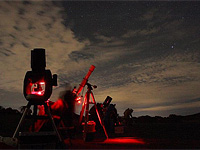 For thousands of years the stars have been our companions. They have been a source of myths and legends, the origin of our calendar and basis for navigation. The night sky has been a motivation for discovering the universe, for space flights and even science-fiction adventures.
For thousands of years the stars have been our companions. They have been a source of myths and legends, the origin of our calendar and basis for navigation. The night sky has been a motivation for discovering the universe, for space flights and even science-fiction adventures.
But in many places the night sky has lost its magnificence and has been overlayed by the scattered light of street lights, billboards and facade lighting. The unnecessary lighting of the night sky and environment is called light pollution. So many people in the cities have never seen the milkyway at all!
Certainly the natural night sky is not only interesting for ecologists and astronomers, but it is also important for fauna and flora. Migrating birds and insects orientate themselves towards the stars, the growth of plants depends on the change of night and day. Even the health of humans is influenced by light pollution, e. g. our day/night rhythm. Wrong lighting in the villages disturbs all that. Furthermore the scattered light is an enormous waste of energy and money!
On the Swabian Mountains in the southwest of Germany it is possible to see a nearly natural night sky in many places. Some of these areas could be the origin of an international dark sky park concept, a reservation for night. You can find Dark Sky Parks in the USA, in Canada, Great Britain and Hungary, for example.
By using aimed lighting it is possible to reduce the light pollution in this region to save the environment in a sustainable way. So friends of our nature and astronomers could enjoy the fascinating night sky. Maybe in a Dark Sky Park Schwaebische Alb sometime?
The aims of our project are:
- information about light pollution and what you can do against it
- to decrease light pollution together with the cities and villages around us
- to save animals and nature by using ecological lighting
- to use the darker nights to observe the stars and share this fascination with people
- to aspire to a dark sky park in the Swabian Mountains
We try to do this in the following way:
- drum up enthusiasm for the starry sky
- raise awareness for light pollution and its consequences
- publish the dark sky project in the Swabian Mountains (Projekt Sternenpark Schwaebische Alb)
- measure the brightness of the night sky in promising areas
- elaborate a lighting concept for ecological and economical lighting together with the villages
- elaborate a concept for a dark sky park in the Swabian Mountains
- education in nature protection, astronomy and star-gazing, telescope meetings
On our web site you find a lot of information about light pollution and our dark sky project, unfortunately only in German. But we translated our advice booklet for you:
